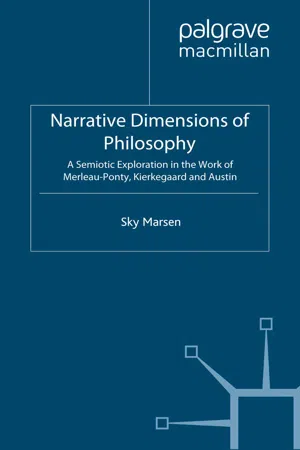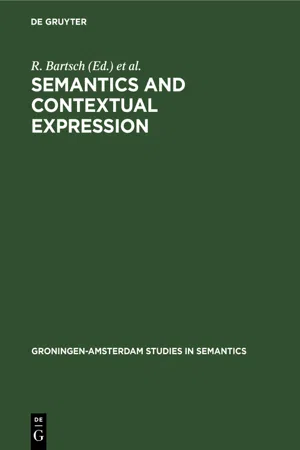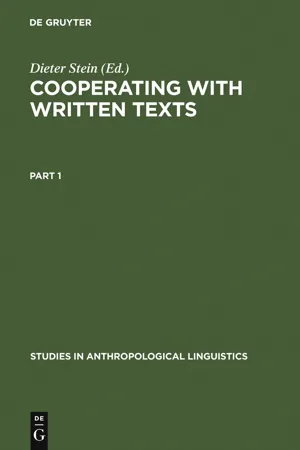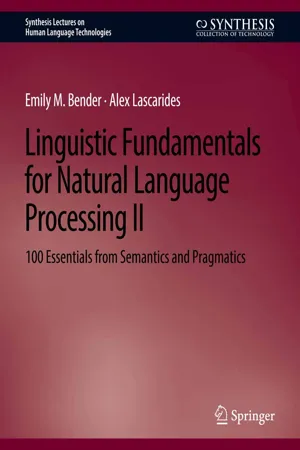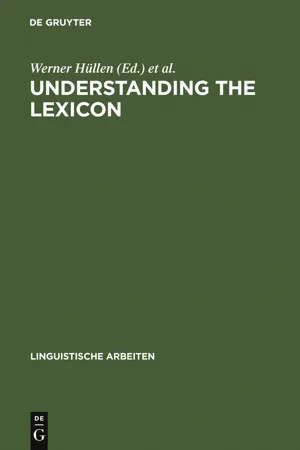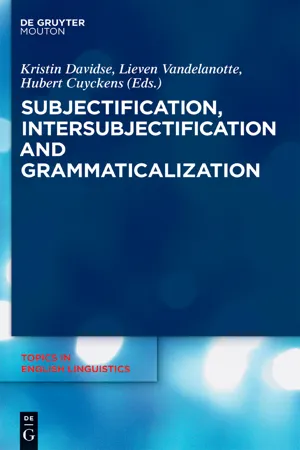Languages & Linguistics
Presupposition
Presupposition refers to an implicit assumption or belief that is taken for granted in a conversation. It is a linguistic phenomenon where certain information is assumed to be true or known by the speaker and the listener. Presuppositions can be conveyed through language in various ways, such as through specific words, phrases, or grammatical structures.
Written by Perlego with AI-assistance
Related key terms
1 of 5
11 Key excerpts on "Presupposition"
- eBook - PDF
Narrative Dimensions of Philosophy
A Semiotic Exploration of the Work of Merleau-Ponty, Kierkegaard and Austin
- S. Marsen(Author)
- 2006(Publication Date)
- Palgrave Macmillan(Publisher)
For example, the pragma- tist Levinson lists thirteen categories of ‘Presupposition triggers’, but warns that ‘it is important to bear in mind that any such list is cru- cially dependent on one’s definition of Presupposition’ (Levinson, 1983: 184), and also points out that ‘there is more literature on pre- supposition than on almost any other topic in pragmatics’ (Levinson, 1983: 167). In a similar vein, the semiotician Eco limits the list of Presuppositional structures to nine and also stresses that ‘any delimitation of the domain of Presuppositional phenomena 124 Narrative Dimensions of Philosophy depends strictly on the definition of Presupposition one uses’ (1990: 223–224). Finally, from a philosopher’s perspective, Palmer empha- sizes that Presupposition is ‘a relation more relied upon than under- stood’ (1985: 1). One reason for this confusion in defining Presupposition could be that the term has been saturated through its use in everyday lan- guage where it is synonymous with such terms as ‘prejudgment’, ‘assumption’ and, often, ‘ungrounded belief’ and even ‘implication’. Although these everyday language definitions share common char- acteristics, in semantics and philosophy ‘Presupposition’ has a strict definition as meaning that is inscribed in the formal structure of lan- guage. Stated simply, a Presupposition is the meaning component of an utterance that remains unchanged when the utterance is convert- ed to negative form. Presuppositions are significant in pragmatics because they consti- tute a significant strategy of meaning manipulation. For instance, the question ‘have you stopped smoking?’ presupposes that the addressee used to smoke, and this Presupposition remains valid regardless of whether the question is negated or affirmed. The only way that the addressee can reject this Presupposition is by refuting the question altogether and not simply by answering it. - eBook - PDF
- R. Bartsch, J. van Benthem, P. van Emde Boas(Authors)
- 2019(Publication Date)
- De Gruyter Mouton(Publisher)
4 Alternatively we may assign one interpretation which is general enough to be compatible with the several Presuppositional readings of a sentence and determine the set of Presuppositions right away on the basis of contextual information and other relevant parameters. The interpretation of the sentence in a context would then consist of the intersection of the proposition expressed by S and the set of Presuppositions assigned to S in this context. Both options contain the claim that 'presuppose' cannot be conceived as a binary relation between sentences, but should be analysed as a three place relation between sentences, contexts, and propositions And, if we identify utterances with sentence context pairs, this simply means that Presupposition is a property of utterances, not of sentences. 5 Presupposition and Discourse Structure 271 In 1982, 1988 Van der Sandt proposed a theory which follows the second path. This theory is based on a contextual notion of Presupposition and relies crucially on the notion of contextual acceptability. Since both the general motivation and the technical details are well set out elsewhere, 6 I will limit myself to a short survey of the basic principles. A simplified summary of the main definitions is given in the appendix. The basic ideas underlying the contextual acceptability account are two simple common sense assumptions regarding the notion of interpretation and Presupposition. The understanding of sentences often requires that we construct contexts in which those sentences can be interpreted. Fur-thermore Presuppositions are normally supposed to belong to these contexts. Given these assumptions it is easy to understand the role of elementary Presupposition in determining the Presuppositions of sentences offered in isolation. They can be conceived as syntactic or lexical indicators of context selection or context construction. - eBook - PDF
Cooperating with Written Texts
The Pragmatics and Comprehension of Written Texts
- Dieter Stein(Author)
- 2011(Publication Date)
- De Gruyter Mouton(Publisher)
For, Presupposition and inference 2 7 9 although all instances of denotative language may have the power to evoke referents, not all have the power to conjure ghosts, i. e., discourse constructs that seem to flicker, not just before the eyes of the characters, but also before the eyes of the reader. That these ghosts are so ephemeral may result, in part, from the textual exploitation (whether designed or undesigned) of conventions of pragmatic inference. Specifically, the equiv-ocal discourse status of the ghosts may be linked to their presentation in Presuppositional constructions. By means of these constructions, infor-mation about the ghosts is consistently presented as though already assumed by both speaker and hearer. Thus, not only is important infor-mation offered in a way that bypasses normal questions of evidentiality, but also the eccentricity of the discourse raises metalinguistic questions about the competence of the narrator. In this way, a pragmatic device usually employed to structure mutual assumption comes to have the opposite effect: that is, it generates scepticism, rather than shared belief. 2. Presuppositional constructions Since 1892, when Frege first used the term to designate the assumptions surrounding proper names, there have been various definitions of pre-supposition current in philosophy and linguistics. For the present pur-pose, however, Presuppositions may be identified as the pragmatic infer-ences triggered by a fairly well-known set of Presuppositional construc-tions and isolated through linguistic tests discriminating between what is asserted and what is presupposed. Thus (la) below, All of John's children are bald presupposes (lb), John has children. And this infer-ence can be isolated by negating the verb of the main clause, as in (lc); questioning the assertion, as in (Id), or inserting it into an if ... then clause, as in (le). (1) a. All of John's children are bald. b. John has children. c. All of John's children are not bald. - eBook - PDF
- Marina Sbisà, Ken Turner, Marina Sbisà, Ken Turner(Authors)
- 2013(Publication Date)
- De Gruyter Mouton(Publisher)
But the trigger is only a partial clue: the contextual requirement imposed by the trigger may be weaker than the context refinement intended by the speaker. If the interpreter infers that this is the case, she will choose to accommodate the stronger (or perhaps simply alternate) proposition that allows her to best make overall sense of the speaker’s utterance. This accommodated proposition is what the utterance will intuitively be taken to presuppose. This type of approach introduces a distinction between linguistic presupposi-tion (conventionally encoded constraints on contexts) and pragmatic presupposi-tion (inferable speaker assumptions about context). The approach allows that intu-itions about Presupposition are typically about pragmatic Presuppositions, but proposes that these intuitions are often to be explained on the basis of facts about linguistic Presupposition. Instances of contextual Presupposition could then be taken to be cases of pragmatic Presupposition lacking any linguistic trigger. However, on this approach all standard cases of Presuppositions, all those which are linguistically triggered, must be assumed to be conventionally encoded. This pragmatic enrichment of the theory is still considerably distant from the Strawson/Grice/Stalnaker idea that (some subset of the) basic Presuppositions themselves can be explained in conversational terms. 6. Open Questions I have attempted in this chapter to survey the major contributions to the linguistic literature on Presupposition, although a complete and thorough survey would require much more space than this chapter is allowed. I have tried, though, to bring out a distinction between approaches which is not typically emphasized: the dis-tinction between those who view Presupposition as an utterance level phenom-enon, and those who view it as a clause level phenomenon (with clause-level ef-fects “projecting up” to the utterance level). - eBook - PDF
Linguistic Fundamentals for Natural Language Processing II
100 Essentials from Semantics and Pragmatics
- Emily M. Bender, Alex Lascarides(Authors)
- 2022(Publication Date)
- Springer(Publisher)
In other words, hearers have the capacity to add the Presupposition to the context in which the utterance is interpreted. You may not know prior to a speaker saying (229) that Sandy has an officemate, but the utterance is felicitous because you can add this fact to the common ground. (229) Sandy’s officemate is a ballroom dancing champion. This process of context adjustment is known as Presupposition accommodation [Karttunen, 1974, Stalnaker, 1974]. For a range of theoretical proposals of how to model this process, in- cluding a variety of takes on the types of constraints that influence how a Presupposition gets accommodated into the context, see Asher and Lascarides 1998, Beaver 1992, Gazdar 1979, Geurts 1996, Karttunen 1974, van der Sandt 1992; and von Fintel 2008. For an implementa- tion of van der Sandt’s [1992] theory of Presupposition, see Bos 2003. #78 Presupposition triggers are a wide and varied set. Presuppositions are usually introduced by particular linguistic words or phrases; these are known as Presupposition triggers. For example, in (225) above, the trigger for the Presupposition that there’s someone called Kim is the proper name Kim, and the trigger for the Presupposition that Kim has a cousin is the possessive construction X’s Y. The same test described in #77 (projec- tion from certain embedded contexts) can be used to identify a wide and heterogeneous set of Presupposition triggers [Levinson, 1993]. We give a brief rundown here: Factive predicates Verbs like know and regret and nouns like fact and knowledge presuppose the truth of their complement: (230) a. Kim knows that a parrot talked. b. Kim regretted that the game was rigged. c. The fact that the parrot talked surprised Kim. d. The knowledge that the game was rigged troubled Sandy. Implicative verbs Other verbs introduce Presuppositions of a more lexically contentful nature. - eBook - PDF
- Wolfram Bublitz, Neal R. Norrick, Wolfram Bublitz, Neal R. Norrick(Authors)
- 2011(Publication Date)
- De Gruyter Mouton(Publisher)
This definition goes back to philosophical and semantic views of Frege (1892) and Strawson (1952), later enriched with semantic-pragmatic analyses (cf. Kart-tunen 1973; Stalnaker 1973; Gazdar 1979). Though these characterizations of presup-position are still generally accepted (cf. Saeed 2009), many linguists have pointed to the existence of counter-examples deeming the mainstream approach (necessarily) “imper-fect” (cf. Huang this volume). In the present chapter, Presupposition is treated as a phe-nomenon which does not rely for its existence on linguistic form alone, but on a complex relation between the linguistic form, the speaker’s and the hearer’s (common) “under-standing of the world” (cf. Grundy 1995: 78), as well as the speaker’s fulfillment of Micropragmatics and macropragmatics 69 felicity conditions for performance of an act involving Presupposition(s). This stance integrates the standard view with several other research perspectives: the speech act ap-proach to Presupposition (cf. Grice 1981; Green 1989), the cognitive approach (cf. Car-ston 1996), the experiential approach (cf. Marmaridou 2000), or the common ground approach (cf. Grundy 1995). 6. Examples of ‘battles’ over the status of Presupposition are Stalnaker (1973), Soames (1989); while Horn (1996), Atlas (2004) and Huang (2007) offer well-balanced over-views. 7. In the present chapter the use of the term ‘implicature’ is synonymous with ‘conversa-tional implicature’. See Huang (this volume) for a comprehensive account of various types of implicature. 8. We do not deal with ‘conventional implicatures’ here (cf. e.g. Davis 1998; Bach 1999). 9. See reductionist attempts such as Horn’s (1984) Q-R model or Levinson’s (2000) Q-I-M principles; for supplements and general overviews see Levinson (2000), Horn (2007, 2009), Huang (2009a, b and this volume). 10. See Austin (1962/1975) and Searle (1975, 1979) for the foundations of the Speech Act Theory. - eBook - ePub
- Michael Toolan(Author)
- 2014(Publication Date)
- Routledge(Publisher)
9 Presupposition Presupposition vs. assertion: foreground and background againTake this section title, and the way that ‘foreground and background again’ implies that foreground and background have been considered on at least one previous occasion: that is what Presupposition is. It is the label for all the linguistic constructions that prompt us to note some further claim or point, behind those explicitly made in a text.In a number of situations in this book, the value of a foreground/background distinction has been emphasized. In narratives, we have seen how the bare and essential event-sequence gets foregrounded by virtue of being expressed, typically, in the simple past tense. Alongside such simple past tense verbs, verbs in present tense, with or without progressive or perfective aspect, are treated as carrying accompanying or background information (often orientational or evaluative). We have also seen, in sentence structure, how whatever comes first in the sentence (which may well not be the subject) is by that means alone foregrounded. Recall how, in Auden’s ‘Musée des Beaux Arts’, suffering itself is foregrounded at the peom’s opening: ‘About suffering they were never wrong, the old masters’. Intonationally, of course, whatever word contains the tonic syllable in a tone group – the syllable with the most striking pitch-change – is foregrounded relative to the surrounding and backgrounded syllables. Narratologically, one might argue that within passages which are predominantly narration, any lexical-sequential level of discourse-construction, those lexical selections which are least predictable and therefore, in a sense, most distinctively informative, are moments of foregrounding (it was suggested that a version of cloze-testing can sometimes sensitize us as to what words are least predictable, therefore most ‘original’ or ‘creative’, and therefore most telling). Thus the foreground-background principle operates at many levels, in literary composition and analysis. - eBook - ePub
- David Beaver, Jason Stanley(Authors)
- 2023(Publication Date)
- Princeton University Press(Publisher)
Heim, “On the Projection Problem for Presuppositions”; Karttunen, “Presuppositions and Linguistic Context”; Stalnaker, “Assertion,” “Pragmatic Presuppositions.” 11. Wittgenstein, Philosophical Investigations, 3. It remains contested whether Eubulides is the originator of the paradox of the heap, and no text of his survives. 12. The mixtures of grammars approach can be found, for example, in the work of historical linguist Tony Kroch (e.g., “Reflexes of Grammar in Patterns of Language Change”). Such methods are also common in computational models of language acquisition, with much work using probabilistic context-free grammars (which allow each grammar rule to be associated with a probability). 13. We are far from being the first to see Presupposition as playing a central role in manipulative language. For example, in Sold on Language, Julie Sedivy and Greg Carlson argue that Presupposition is an important device in advertising. 14. Karttunen, “Presuppositions and Linguistic Context.” Karttunen’s model of Presupposition is closely related to Stalnaker’s. Both propose to explain Presuppositional data in terms of the contexts in which utterances occur, and both allow that these contexts will be updated dynamically as conversation proceeds. However, Stalnaker’s model cannot properly be described as an account of Presupposition projection, because the pragmatic model of Presupposition he develops does not assume that Presuppositions are conventionally associated with particular constructions, i.e., Presupposition triggers. If there are no Presupposition triggers, it doesn’t make much sense to ask what happens when Presupposition triggers are embedded - eBook - PDF
Philosophical Essays, Volume 1
Natural Language: What It Means and How We Use It
- Scott Soames(Author)
- 2008(Publication Date)
- Princeton University Press(Publisher)
We have seen that this link is not provided by three valued truth tables that give rise to logical Presuppositions. Thus, some other explanation is needed. Recently, Irene Heim has attempted to provide such an explanation. 45 The key innovation is the development of a semantics for entire dis-courses, rather than individual sentences. Since pragmatic presupposi-tion is itself a discourse phenomenon, it is natural to think that it might be linked to such a semantics. Presupposition • 113 45 Heim (1982, 1983). Heim’s semantic system is designed to assign (single) propositions to discourses, where propositions are taken to be sets of possible worlds and discourses are thought of as sequences of sentences. In this frame-work, the meaning of a sentence is given by a rule that determines its contribution to the propositions expressed by discourses containing it. These propositions are determined by starting with the set of all possible worlds and eliminating those incompatible with each of the sentences in turn. The end result is the “proposition” that the semantics assigns to the discourse as a whole. To begin with, we can think of semantic-contexts as sets of possible worlds. The semantics consists of a recursive definition of a function, + , from sentences and semantic-contexts to semantic-contexts. For exam-ple, the clauses in the definition for negation, conjunction, and material conditionals are given in (49). (49a) C + ⎡ A and B ⎤ = ( C + A ) + B (49b) C + ⎡ Not A ⎤ = C ( C + A ) (49c) C + ⎡ If A , then B ⎤ = C (( C + A )(( C + A ) + B )) ( X Y is the intersection of X with the complement of Y. ) The discourse sensitivity of the semantics shows up in an analysis of indefinite noun phrases designed to handle discourses like (50). (50) Mary met a man. He was F. The problem illustrated by this example arises from two elementary ob-servations. The first is that the initial sentence expresses an existential rather than a singular proposition. - eBook - PDF
Understanding the lexicon
meaning, sense and world knowledge in lexical semantics
- Werner Hüllen, Rainer Schulze, Werner Hüllen, Rainer Schulze(Authors)
- 2011(Publication Date)
- De Gruyter(Publisher)
It has been established (Van der Sandt 1982, 1987; Seuren 1985; Fauconnier 1985) that Presuppositions (and thus lexical preconditions) fulfil a dual function: they play a role in the deter-mination of truth-values with respect to a given model ('the world 1 ), and, moreover, they contribute in an essential way to coherence and acceptability of discourses. The general view is that Presuppositions must have been incre-mented to any given discourse domain before the carrier sentence can be deemed 'acceptable 1 in that discourse. Tunis incrementation can take two forms: actual or virtual. 'Actual incrementation 1 implies that some sentence expressing the Presupposition in question has been actually pronounced in preceding discourse, and has thus been incremented in virtue of having been uttered. 'Virtual incre-mentation 1 implies that the sentence has not been actually pronounced, but is incremented post hoc, when the carrier sentence is uttered. This post hoc, or 'backward 1 incrementation (also called 'acccranodation') is made possible by the fact that Presuppositions are structural properties of sentences, derivable from lexical preconditions. Backward incrementation is, moreover, subject to a cognitive condition: normally speaking, a Presupposition can be incremented post hoc only if it is compatible with available background knowledge. Under conditions that are not very clear, this background knowledge check can be overruled. Typically, in such cases, a metaphor comes about. E.g.: 9 (14) And the train was waltzing at sunset round the walls of Verona. 8 For a detailed discussion of this aspect of linguistic communication, see Seuren (1985: 214-8). 9 From: E. M. Forster, Where Angels Fear to Tread. 181 This sentence violates a lexical precondition of the predicate waltz, which requires that its subject term refers to an animate being capable of walking or dancing. - Kristin Davidse, Lieven Vandelanotte, Hubert Cuyckens, Kristin Davidse, Lieven Vandelanotte, Hubert Cuyckens(Authors)
- 2010(Publication Date)
- De Gruyter Mouton(Publisher)
A type of pragmatic meaning that we believe illustrates the potentially active role of hearers and that has received much less, if any, attention than conversational implicatures in the overall realm of historical linguistics, are Presuppositions. To take a simple example of the phenomenon, the utterance in (2), (2) I have to take my sister to the station. presupposes that the proposition ‘the speaker has a sister’ forms part of the speaker and hearer’s Common Ground. However, as is well known, utter-ances like (2) are very common and actually perfectly felicitous even if the hearer did not know previously that the speaker had a sister. The hearer in such a case accommodates this Presupposition (cf. Lewis 1979; von Fintel 78 Scott A. Schwenter and Richard Waltereit 2000; Lambrecht 1994; Beaver and Zeevat 2004; among many others): under the assumption that the speaker is communicating cooperatively, the hearer will accept this accommodated Presupposition into the Common Ground. Presupposition accommodation is a pragmatic operation that falls genuinely within the remit of the hearer. Only if the Common Ground, as the set of mutually projected assumptions about each discourse partici-pant’s knowledge, does not contain that proposition will the hearer have to accommodate it in the first place. In the case of an utterance like (2) the hearer may perform this operation noticeably, but smoothly, and will maybe not assume that any deliberate action by the speaker was involved. The speaker could certainly have avoided this operation and have introduced the proposition into the Com-mon Ground as an independent assertion: (2 ƍ ) I have a sister. I have to take her to the station. In the case of (2 ƍ ), no Presupposition accommodation would be involved. However this might be considered a rather cumbersome way of speaking, and intuitively (2) seems to be the more natural and indeed more common variant.
Index pages curate the most relevant extracts from our library of academic textbooks. They’ve been created using an in-house natural language model (NLM), each adding context and meaning to key research topics.
